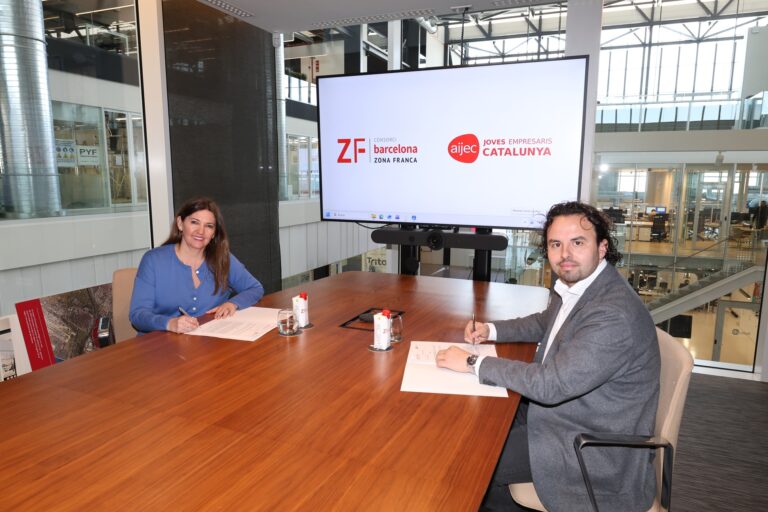89.5% of Spanish shippers believe that Logistics 4.0 has improved the efficiency of the Supply Chain
10 de April de 2024
- More than half of the companies plan to make investments of more than one million euros to adapt to the 4.0 economy in five years time, increasing interest rates by 6.6% compared to last year.
- Companies increasingly value the figure of the logistics manager when making key decisions in companies, 77.5% consider that it is essential or quite important for them to be part of the process.
- The commitment of companies to the SDGs continues to grow, with 80.7% stating that they are very or fairly committed. Only 2.7% remain on the sidelines.
Barcelona, 10 April 2024. – SIL 2024, the world’s leading International Logistics, Transport, Intralogistics and Supply Chain Fair, has carried out the XIV Logistics Circle Barometer 2024, which provides an in-depth analysis of the logistics sector. This study has had the collaboration of 1.019 Spanish Logistics or Supply Chain directors from different sectors of the industry who have participated as members of the SIL 2024 Logistics Circle. The profile of the sector of activity of the different directors or managers of Logistics or Supply Chain who have participated in this XIV SIL Logistics Circle Barometer has been as follows:
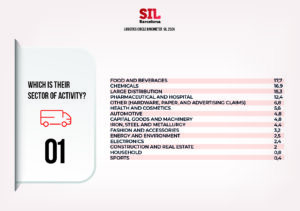
89.5% of companies believe that innovation has contributed to improving logistics efficiency
One of the main conclusions of the XIV SIL 2024 Logistics Circle Barometer is that companies in the sector affirm that automation, robotization and, ultimately, innovation, have contributed greatly to improving the efficiency of the Supply Chain. More specifically, 89.5% of the professionals who responded to the study rated this improvement very or quite a lot.
More specifically, 49.2% of the professionals who participated in the survey point out that logistics 4.0 has contributed a lot to the efficiency of the supply chain and 40.3% believe that it has done so quite a lot. While 8.8% believe that the contribution of all these innovations has been low in terms of efficiency, only 1.7% of the people surveyed consider that there has been no contribution at all.
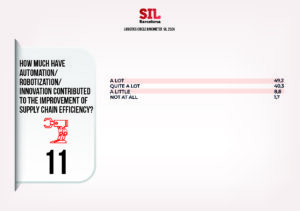
80.7% of companies are committed to the SDGs
Another of the conclusions of the XIII SIL 2024 Logistics Circle Barometer is that 80.7% of Spanish industrial companies state that they are committed to the United Nations Sustainable Development Goals within the time horizon of the 2030 Agenda. This figure represents an increase of about 3.5% compared to the previous barometer carried out last year. Among them, 36.8% say they are very committed to the SDGs, a figure that increases by 1.4% compared to the 2023 study.
43.9% of the logistics and/or supply chain directors who participated in this study said that their companies carried out quite a few actions aimed at achieving the SDGs, which implies an increase of 2.1% compared to the previous edition.
Finally, the number of companies that say they are little committed to the United Nations SDGs also decreases with 16.5% (0.8% less than in 2023) and those that do not carry out any action aimed at achieving these goals with 2.7%, which is 2.8% less than the previous year.
Logistics managers are increasingly contributing to decision-making in companies
Regarding the consideration of logistics professionals in companies, it should be noted that 77.5% of the executives surveyed consider that logistics managers actively participate in key decision-making in their company. In fact, in 34.8% of cases, their participation is considered fundamental and in 42.7% it is quite important. In this way, the trust placed in logistics managers by companies in the decision-making process increased by 18.6% compared to last year.
On the other hand, 13.5% of the people surveyed believe that logistics managers participate in the key decision-making processes for their companies and 8.4% consider that they should contribute to a greater extent.

International conflicts and e-commerce highlight the work of logistics companies
The logistics sector continues to advance in its fight to achieve greater visibility in society, being one of the economic activities most closely linked to international and geopolitical situations. Although the Covid-19 pandemic highlighted the essential nature of the sector, there are other aspects that have contributed to making logistics visible as a basic necessity activity among citizens. According to the professionals participating in the XIV SIL Logistics Circle Barometer 2024, international conflicts lead the ranking of factors that have highlighted the importance of the sector, specifically, by 36.3%.
Likewise, according to the respondents, ecommerce remains firm in the statistics and ranks second in the race to contribute to the visibility of logistics, accounting for 31.5% of the responses. While it is true, the rise of e-commerce suffers a slight decrease of 3.4%, as indicated by the conclusions of the study.
For its part, although it is still considered one of the factors that has made the sector more visible in recent years, with 25.3%, the Covid-19 pandemic occupies the third position on the list, decreasing by 20.1%, compared to the previous year. Similarly, the barometer reflects a slight decrease of 2.6%, in terms of its contribution to making logistics visible, of the microchip crisis being selected by 6.2% of the participants in the study. 0.7% of the responses allude to other factors such as national crises or strikes, among other conjunctural aspects.
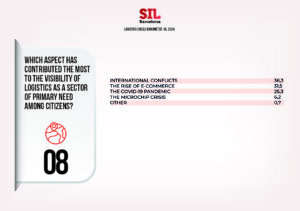
Automation, collaboration and exchange will be essential in the logistics of the future
Another of the conclusions drawn from the XIV SIL 2024 Logistics Circle Barometer is that the automation of operations, which is growing by 4.1% compared to last year, as well as collaboration in transport and the exchange of standardised information are the three aspects that companies consider to be of greatest importance in the logistics of the future. Thus, 31.2% of respondents emphasize automation, 27.2% point to collaboration in transport and 22.6% opt for information sharing.
On the other hand, the study concludes that more and more companies are opting for personalized services, with the fourth option chosen by those interviewed accounting for 12.3% of the responses, increasing by 2.5% compared to 2023. Finally, although to a lesser extent, there are other aspects that respondents value as essential in the logistics of the future, such as collaboration in warehousing, resilience, and training.
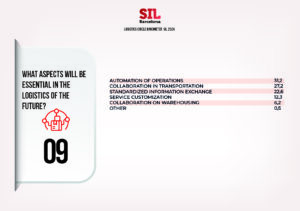
Transportation and distribution continue to lead the way in outsourcing
About the outsourcing of logistics activities by companies, the changes observed are not significant in the trend observed in recent years. The most outsourced logistics activities, as has been usual in previous Barometers of the Logistics Circle, are, without a doubt, transport and distribution. 92% of the professionals who have participated in the XIV SIL Logistics Circle Barometer 2024 say that they outsource their company’s transport services, a figure that is slightly down 3.7% compared to 2023. Therefore, transport continues to be the undisputed leader in this category and is far behind the second most outsourced activity, which continues to be distribution, with 54%, which experiences an increase of 3.6% compared to last year and compensates for the decrease in transport activity.
Further behind are packaging and packaging, with 28.3%, handling and stock management, with 18.2%, and system automation, which accounts for 19.5% and increases by 2.3%, compared to 2023. Finally, there is production, with 9.7%, and purchases, which continues to increase for the third consecutive year and remains in seventh place, accounting for 7.2%, 2.3% more than in 2023.
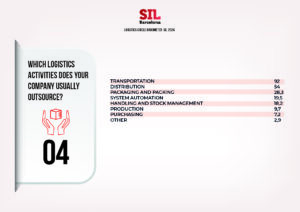
Flexibility imposes savings among the most valued aspects
Quality is, once again, the aspect most valued by the Logistics or Supply Chain directors of Spanish industrial companies when it comes to outsourcing a logistics service with 89.4%, with a significant increase of 6.8% compared to the previous edition of this study.
The second most valued aspect continues to be experience and trust with 66.3% and, in third place, flexibility prevails over savings, ranking third in the ranking, with 57.3% and a notable increase of 9.4%. In this way, savings are in fourth position, accounting for 55.8%. In the same vein, speed continues to gain ground, with 34.7% occupying fifth place on the list and increasing by 3.3%.
A highlight is the incorporation of a new factor in this edition of the study: sustainability. This new variable is in sixth place, with 32.2% and overtakes specialization, which is in seventh place, with 29.6%.
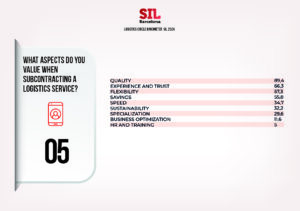
Quality, efficiency and punctuality are the main logistical concerns
Service and quality (20.6%) continues to be the main concern of Spanish shippers for the third consecutive year. In second place, efficiency and cost and stock optimisation are also maintained (18.3%), a figure very similar to that of 2023 and 2022. In third place, speed, punctuality and commitment also remain in third place (14.8%), although increasing by 3% compared to the previous year.
For its part, sustainability remains the fourth logistics concern for Spanish shippers with 9.4% of cases, a figure that increases for the second consecutive year, in this case by 1.5%. Planning (7.3%) and communication and information (6.8%) are in fifth and sixth place, while the recruitment of qualified personnel continues to account for 4.7% and occupies seventh position.
Finally, it is worth noting the 3% decrease in concern about the evolution of the transport sector, which fell two positions compared to last year, and now occupies eighth place with a total of 4.1%.
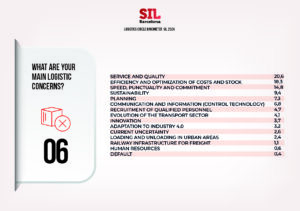
More than half of the companies will invest more than one million euros
A conclusion of the XIV SIL Logistics Circle Barometer 2024 to highlight is the increase in the forecast of investments by companies to adapt to the 4.0 economy. According to the results of the survey, 51.2% of companies plan to make investments of more than one million euros in the next 5 years. This figure represents an increase of 6.6% compared to the results of the 2023 study and means that more than half of the companies participating in the survey will exceed one million euros of investment. Thus, 19.3% of logistics and/or supply chain managers in the Spanish industry state that they plan to invest between 1 and 5 million euros in the next five years.
At the same time, the investment forecast for higher amounts, ranging from 5 to 50 million euros, has grown significantly. More specifically, investments between €5 million and €10 million accounted for 10.3%, an increase of 3% compared to last year. Similarly, the number of companies that have expressed the willingness to invest between 10 and 50 million euros adds up to 6.9% and increases, even more, if possible, by 4.2%, this being the band where intention and investment increase the most.
However, the intention to invest more than 50 million euros suffers a slight decrease of 1.7% compared to the results of the SIL Logistics Circle Barometer 2023, accounting for only 4.7% of the responses in this edition of the study.




